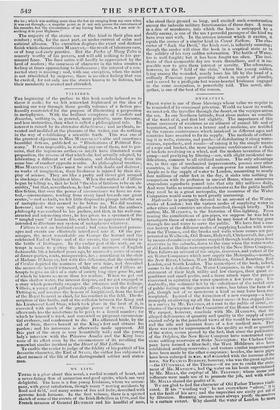vieerERS.
THE beginning of the preface to this book nearly induced us to throw it aside; for we felt somewhat frightened at the idea of
making our way through three goodly volumes of a fiction pro-
fessedly constructed for the purpose of illustrating a proposition in metaphysics. With the brilliant exceptions of Candide and .Rasselas, nothing is, in general, more pedantic, more tiresome, and less instructive, than what is called a philosophical talc. Its interest is ruined by its obtrusive didaclicuess ; and incidents, in-
vented and modified at the pleasure of the writer, can do nothing
in the way of establishing a scientific truth. This was one of the greatest objections to Miss MARTINEAU'S able and sometimes
beautiful fictions, published as " Illustrations of Political Eco- nomy." It was impossible, in reading any one of them, not to per- ceive, that the ingenious authoress might have illustrated some proposition, the reverse of that which she had actually adopted, by fabricating a different set of incidents, and deducing from the same line of conduct opposite results. As philosophical treatises,
Miss MARTINEAU'S Tales must be read with doubt and distrust ;
as works of imagination, their freshness is injured by their dis- play of science. They are like a pretty and clever girl arrayed
in stockings of the brightest blue. When the author of Villiers
began by telling us, that he held "the idea of fatalism to be an ab- surdity," but that, nevertherless, he had " endeavoured to show, in
this fiction, that over the power of circumstance we have no con-
trol,--circumstance, tending from every hand towards one great centre,"—and so forth, we felt little disposed to plunge into the sea of metaphysics that seemed to lie before us. We did venture,
however; and were very well pleased to find that the author's philosophy xi as confined to his preface, and that, in his well-con-
structed and interesting story, he has given us a specimen of the " tangled yarn" of human life, which has no appearance of being intended to illustrate any system of metaphysics whatever.
Villiers is not an historical novel ; but some historical person- ages and events arc effectively introduced into it. Of the per-
sonages, the most remarkable are George the Second and the celebrated Earl of Stair; and of the events, the most striking is
the battle of Dettingen. In the earlier part of the work, an at-
tempt is made to portray the habits and manners of English fashionable life a hundred years ago, by means of a series of scenes of dinner-parties, routs, masquerades, Sze.; something in the style
of Madame D'Anesav, but with this difference, that the authoress of Cecilia depicted the manners of her own time, and described the scenes she herself witnessed, while the author of t alliUus at- tempts to give an idea of a state of society long since gone by, and of which he knows no more than his readers. W hen we get out
of this shallow water, the interest deepens, and we get engaged in a story which powerfully engages the attention and the feelings. Villiers, a young and gallant cavalry officer, shares in the glory of Dettingen, mid receives the honour of knighthood, from the hand of the Royal General in chief; for his conduct in the field. The de- scription of this battle, and of the collision between the King and his Lieutenant Lord Stair, which took place in the heat of it, is
executed with much of the graphic power of SCOTT. Villiers afterwards has the misfortune to be privy to a horrid murder; for
which he himself is tried, and convicted on pregnant circumstan- tial evidence, and condemned to die. His affianced bride, by the • aid of Stair, throws herself at the King's feet and obtains his
pardon ; and his innocence is afterwards made apparent. All this part of the story is very beautifully told ; and the young lady's interview with the Princess Amelia and the King loses none of its abet even by the circumstance of its recalling the somewhat similar incident in the Heart of Mid Lothian.
To enable the reader to judge of' the fidelity of his portrait of his favourite character, the Earl of STAIR, the author has subjoined a short memoir of the life of that distinguished soldier and states- man.


























 Previous page
Previous page